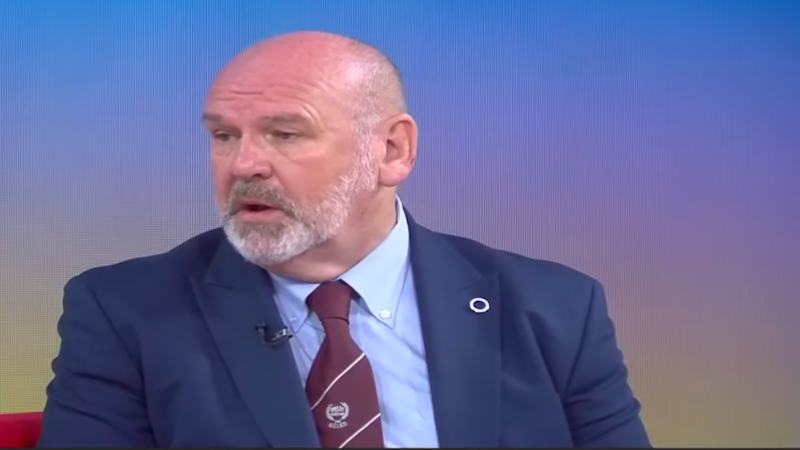And warns train drivers could strike for 20 years if necessary

General secretary of the train drivers’ union ASLEF cleared up some information around his unions ongoing dispute in an interview with Kay Burley on Sky News yesterday.
On Monday, train drivers kicked off a week-long overtime ban, with a further week now scheduled from 17-22 July which will see train journeys across the country affected.
Speaking to Burley on Sky News, the union leader Mick Whelan declared that train drivers would strike for 20 years if necessary and called out the government for abandoning talks stating, ‘this is dogma rather than industrial’.
In their latest strike mandate, members voted higher than they had before for industrial action, despite 14 months of strikes so far, which Whelan said reflected their huge resolve to take action for as long as necessary.
Train drivers are taking industrial action following four years of not receiving a pay rise, in a national dispute that began over a year ago and concerns 16 rail companies.
The union has accused the government and rail operators of refusing to come to the table and resolve the dispute. ASLEF rejected a 4% pay increase proposal in March, in a deal that the union said ignored their proposals to modernise the railways.
When Kay Burley suggested to Whelan, “you’re on the canvas now, why don’t you just stand down?”, Whelan replied, “so we just walk away do we, do we go five years without a pay deal, 10 years without a pay deal?”.
Responding to the point that the union rejected the 4% pay increase Mick Whelan pointed out that it would still be a pay cut.
“We all know that inflation has been running north of 10% and we weren’t seeking a pay rise for the two years before, so if you aggregate it would have been virtually a 25% pay cut for half a billion pounds worth of productivity that we’re unable to give.”
In response to questions on train drivers pay, Whelan said train drivers work an ‘awful lot of overtime’ and give ‘an awful lot of good will’, which he said the effects will be clear this week as drivers carry out their overtime ban.
Train companies rely on drivers working ‘rest days’ and overtime to run their timetables, which mean an overtime ban is predicted to cause a fair amount of disruption across networks.
Speaking of pay demands, Whelan was pushed to say how much the union would accept. He set the record straight to emphasise that he had ‘never put a price on it’, because it was the point of negotiations to reach a reasonable pay offer.
“The trouble is Kay, as you know, in all negotiations that it’s like selling your house, as soon as you put a price on something, someone tries to undercut it. It will come out of the talks and then depend on what other people want within those talks.”
When asked why the pay deal hadn’t been put to his members, the union leader gave an explainer on the process, which was set by the members themselves.
“We’ve agreed a framework agreement that we work through our normal collective bargaining process that we have with the employers, they recognise that we don’t put any deals out we can’t recommend, because that’s the policy of our members.
“So putting the deal out with our red lines in it is set up to fail.”
He added: “When we get a deal that we can recommend, that’s when we go to our members, because that’s what they tell us to do.”
When pushed on this point he pointed out that, as leader of the union, he spends most of his time talking to members and finding out what they want in order to best represent their interest, as this is his job.
Asked about the disruption industrial action causes on commuters, Whelan pointed to the wider issue regarding the government’s approach to pay negotiations that have affected many other sectors.
He highlighted that, away from Westminster, there was not a problem with any other employer.
“I’ll keep making this point, we don’t have a problem with Scotland, Wales, we don’t have a problem in Freight, with Open Access, with Cross Rail, the Eurostar, the Tube. This is a Westminster problem and its dogma rather than industrial.”
When it was suggested that he was getting on better with this transport secretary, Whelan said he hadn’t seen him since before Christmas and that he hadn’t seen the Rail Minister since 6 January, so it was hard to have a good relationship with someone you never see.
(Photo credit: Sky News / YouTube screenshot)
Hannah Davenport is trade union reporter at Left Foot Forward
Left Foot Forward’s trade union reporting is supported by the Barry Amiel and Norman Melburn Trust

Left Foot Forward doesn't have the backing of big business or billionaires. We rely on the kind and generous support of ordinary people like you.
You can support hard-hitting journalism that holds the right to account, provides a forum for debate among progressives, and covers the stories the rest of the media ignore. Donate today.



